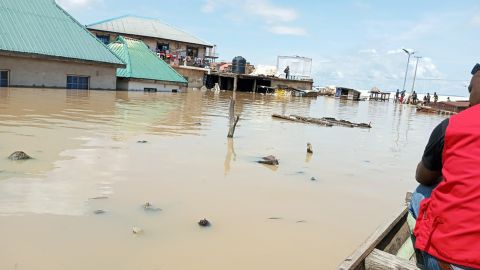The Federal Government has secured a €275 million funding package to accelerate the implementation of the Nigeria Erosion and Watershed Management Project (NEWMAP) and other environmental sustainability initiatives to combat climate change and enhance land reclamation efforts across the country.
Minister of Environment, Balarabe Lawal, announced the development at a forum on Government–Citizens Engagement, themed: “Assessing Electoral Promises: Fostering Government–Citizen Engagement for National Unity,” organized by the Sir Ahmadu Bello Memorial Foundation in Kaduna.
According to the Minister, €175 million of the funds will directly support NEWMAP implementation, while the remaining will aid in related sustainability projects.
In addition, the Federal Government has finalized plans to establish a National Flood Insurance Policy and expand the National Sovereign Green Bond to ₦250 billion to finance eco-friendly infrastructure and development.
Lawal noted that the Ministry is also making significant progress in reinforcing environmental protection and food security, especially in the northern region.
“We are advancing efforts to deploy Forest Rangers across the 19 northern states and the FCT to secure our forests and eliminate criminal activities,” he stated.
He highlighted the government’s commitment to combating desertification and increasing green cover through the planting of over 5.5 million trees under the National Agency for the Great Green Wall (NAGGW) and the Agro-Climatic Resilience in Semi-Arid Landscapes (ACReSAL) programme.
Furthermore, the Forest Research Institute of Nigeria is preparing 10 million drought-resistant seedlings for planting in 2025.
Additional reforestation efforts include the cultivation of five million date palm and 3.85 million neem seedlings for the 11 frontline states.
Shelterbelts have been extended by 175 km across seven northern states to halt Sahara Desert encroachment, and 278,235 hectares of degraded land have been restored so far.
In a bid to provide sustainable alternatives to wood, the Minister revealed that the government is promoting bamboo as a viable substitute.
“The Bamboo Factory established in Kogi State has created over 20,000 jobs, developing a strong bamboo and rattan economy,” Lawal said.
To promote eco-tourism, biodiversity, and job creation, the Federal Government has taken over the management of three national parks—Kampe, Marhai, and Hadejia Wetlands, with four additional parks in Kano, Plateau, Niger, and Katsina set for handover.
Lawal also disclosed that the government has significantly improved its flood and erosion response systems. “Our flood alert system now covers 258 communities with 90 percent accuracy, reducing loss of life and property,” he said.
He noted that 198 flood and erosion control projects have been executed nationwide, including the Jibia River Bank Protection (1,812 hectares), Hadejia River desilting (182,780 hectares), and Nguru Wetland Rehabilitation (29,622 hectares).
On agricultural support, the Minister stated that ₦12 billion has been disbursed to 9,648 individuals across 16 northern states through agricultural value chain initiatives.
The government has also distributed tractors, fertilizers, and milling machines to improve food security and agricultural productivity.
In line with the transition to a circular economy, Lawal announced the creation of over two million new jobs under the Circular Economy Roadmap.
He revealed the commissioning of a $2.9 million Plastic Polyethylene Facility in Idu, Abuja, employing 550,000 waste pickers, mostly women, earning an average of ₦75,000 monthly in Kaduna, Kano, Katsina, and Zamfara.
On climate action, the government has launched a National Clean Cooking Policy, targeting the distribution of clean cookstoves to 20 million households in northern Nigeria. This is being supported by a ₦50 billion Green Bond, reinforcing Nigeria’s commitment to green development and environmental sustainability.







